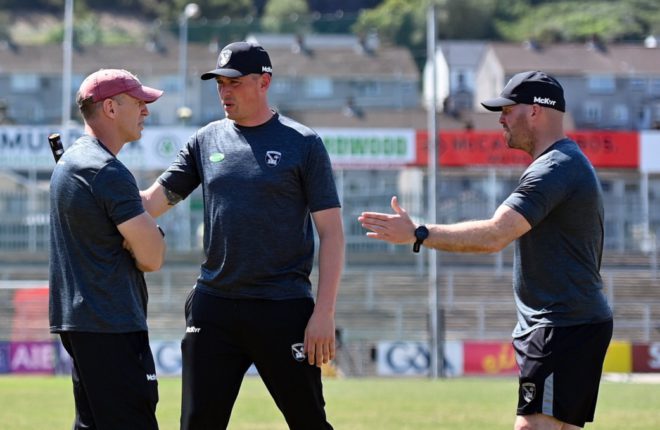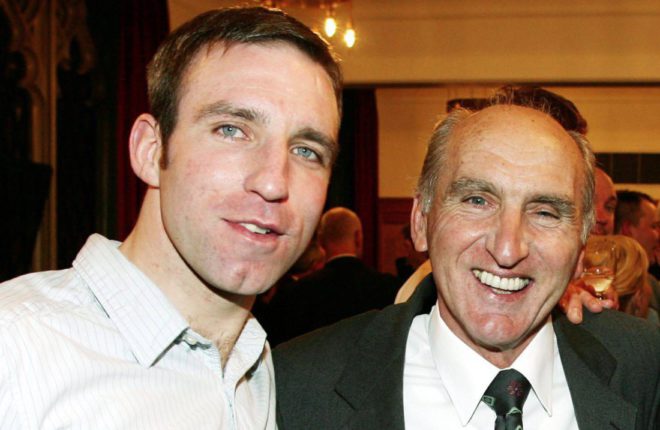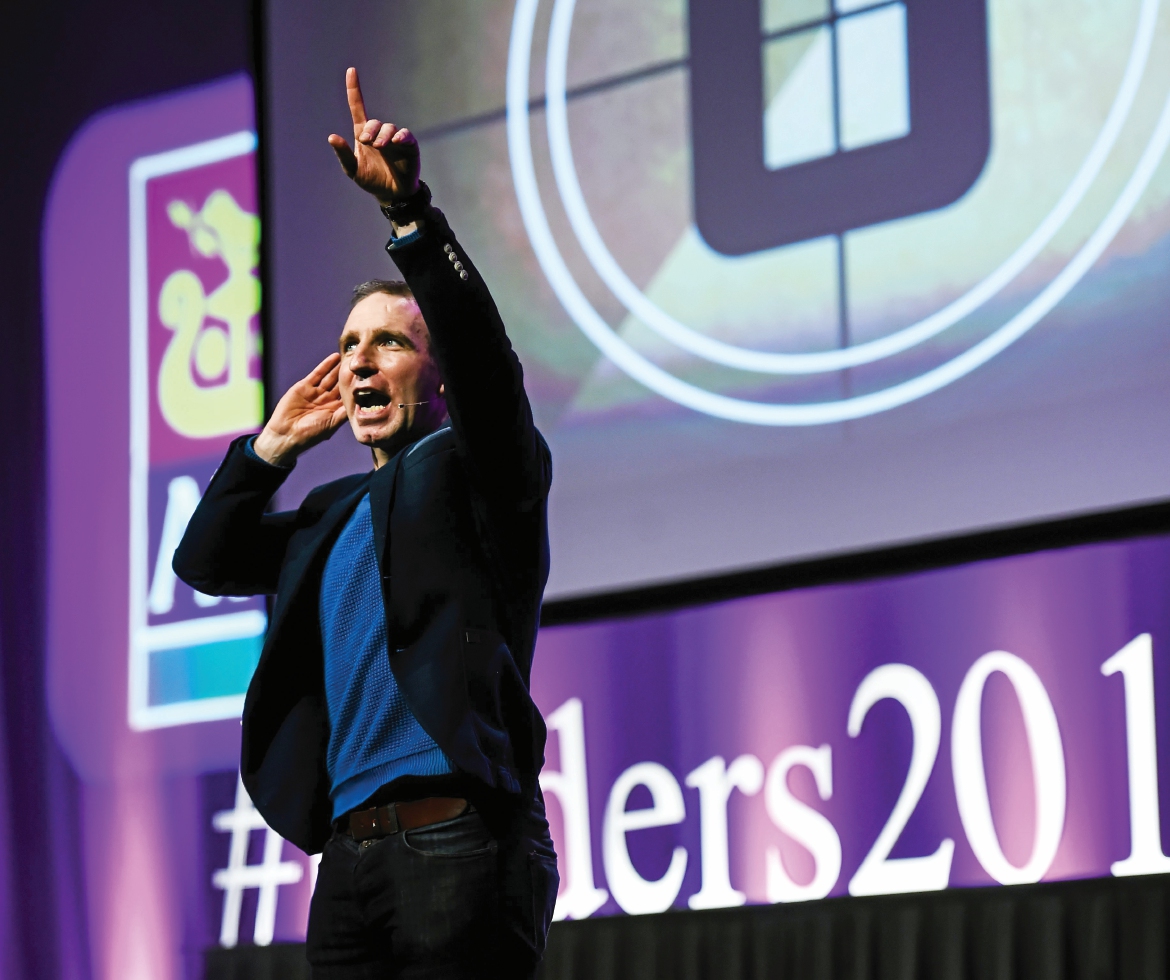By Michael McMullan
CALM and collected. You don’t need to be talking to Enda McNulty for too long to get an insight into the building blocks for Armagh’s success.
There is no fluff. Every word has a purpose. The sentences are carefully crafted.
Communication doesn’t kick the ball over the bar for you, but it was at the heart of Armagh’s defensive diamond.
The pre-match ritual was a coffee with his brother Justin and Kieran McGeeney on the eve of every crunch contest.
It helped iron out any doubt of what was coming down the tracks. They’d shoot the breeze, but conversation would invariably turn to the size five and anything their opponent had to offer.
“We had that understanding that no matter what happened on the pitch, we’d be better at handling it,” McNulty said, stressing the priority of keeping a clean sheet.
“We had an unbelievably good understanding in that wee diamond and we knew how important it was to communicate with Francie (Bellew) who was amazingly consistent as well.”
When Sunday came, they were armed with a snapshot that they’d convey to jovial goalkeeper Benny Tierney behind them, to wing men Andrew McCann and Aidan O’Rourke and to Paul McGrane and John Toal beyond.
“We were very proud of that collective unit and that understanding from a defensive point of view,” he adds.
In any crunch moment, the mental imagery polished over a cuppa gave them nanoseconds of a head start.
Their lifetime of basic skills, crafted physiques and tuned engines would follow.
Qualified as a psychologist, Enda McNulty went on to set up his own performance company McNulty Performance, based in Dublin.
A light-bulb moment coming home from the 2005 All-Star tour of Hong Kong inspired him to swap a role as coaching director in Dublin GAA superpower Ballyboden St Enda’s for a wider canvass. One without limits.
He wanted to leave his imprint on the leading sporting and business personnel across the world.
A matrix of dots across a map on their website gives a snapshot of the need for 12-hour days to keep a lid on some 150 organisations and 50 high performance sporting teams spanning over 45 counties.
Regardless of the schedule of flights and airports dished out, he factored in a return every “two or three” weeks to his native Mullaghbawn, where he won an Ulster Club medal before making the move to Dublin where he played with Na Fianna.
Amazon, Facebook and Google are among his clients, but home is where the heart is. The orange wave of emotion that engulfed Clones hasn’t escaped him.
Armagh’s win over Donegal backed up their chinning of All-Ireland champions Tyrone as they tried to get off the canvas.
While not directly involved, McNulty mucked through the trenches with Kieran McGeeney long enough to have a flavour of the ingredients in the mixing bowl ahead of Sunday’s date with Galway.
“It is an inspiration to see how much work has been done in the county over the last five years,” McNulty said.
“I know the players, the coaches and the backroom staff will only be focused on this game at the weekend.”
Hype and buzz will exist without being the dominant noise in the Orchard epicentre.
“They’ll be concerning themselves with the game and the battle that lies ahead, knowing how difficult that challenge is going to be, they’ll be very aware of how good this Galway team are,” McNulty outlines.

HOLY TRINITY…McNulty beleives the current Armagh management will demand more from the squad
Seven Ulster titles tell one side of his playing career, but a solitary All-Ireland medal tells the other side.
Galway manager Pádraic Joyce – and selector John Divilly twice climbed the All-Ireland mountain in that window. It frames McNulty’s regret of not getting his hands on Sam Maguire more than once, coating his next statement with a layer of context.
“I think of the Galway coaches and backroom staff, which everybody would have the highest respect for,” he said.
He senses the excitement of Armagh being back in Division One. On the outside, a league victory over Dublin with an expansive brand of football accelerated the optimism that morphed into the emotion after the recent wins over Tyrone and Armagh.
A constant posing for photos and endless searches for autographs amidst a positive glow are inspiring the next generation.
With the permanent thinking cap of a former player and deep thinker, McNulty locks in on the mechanics behind it all.
“It takes a lot of effort to get there,” he adds. “I was up home at the weekend and the people are very excited and very proud of the work that has been done, but they are very cognisant that this is a huge challenge at the weekend.
“Nobody is taking in any way for granted anything of what the team has achieved this year. I know the coaches, the players and the backroom staff will only be focussed on this next step against Galway.”
He knows ‘Geezer’ and Ciaran McKeever very well. They are cut from the same cloth, woven in South Armagh where a much-documented oppression off the pitch moulds character as much as any near misses in the face of Championship’s white heat.
McNulty stood in the opposing corner to Kieran Donaghy enough to get a taste of the steely focus inside the Armagh camp this week.
“The entire coaching staff, the conditioning team, the psychologist Hugh Campbell – I think they will be very happy with the progress they have made so far,” he said, having being a player when Campbell was part of Joe Kernan’s backroom team – with fellow psychologist Des Jennings – when Sam Maguire rested in Armagh 20 years ago this year.
“I know the personalities; their psychology and mind-set, they won’t be looking back and be happy with their lot. It will be unbelievably grounded for this game and it will be a ‘one-game mentality’ for this weekend.”
***
The Abbey Corn na nÓg winning team of 1991 had a stronger spine than most. Aidan O’Rourke and Tony McEntee backboned a defence, with Barry Duffy listed at corner-back. John McEntee and Enda McNulty were the midfield pairing.
Medals eluded them at MacRory and county minor level. By the time Armagh won the 1998 Ulster U-21 title, they were overage, but part of the senior panel as the wheels began to turn from a hammering to Derry at home in 1995 towards the county’s trailblazing team.
“So it takes at least six or seven years from being an average team to be a team that can go on and win the All-Ireland…that was only in that cohort.”
Add in Paul McGrane, Diarmuid Marsden, Barry O’Hagan, Andrew McCann and Justin McNulty from the squad sunk by a smash and grab by a Trevor Giles-inspired Meath in the 1992 All-Ireland Minor final with substitute Michael Farrelly’s killer goal. By that stage Kieran McGeeney was always on the senior panel.
“So the mathematics of that is that it took them even longer to go up and beat the best teams in the country on a consistent basis,” McNulty adds.
Before the call with Gaelic Life, McNulty’s working day took him into a conversation with a world leader in sport, an icon.
The chat circles around the need for “strong” leaders and the winning culture in such of environments.
The same principles fit the Armagh team he played on. McNulty relates it to the progress of Derry under Rory Gallagher. The same can be said for the Galway and Armagh teams crossing paths on Sunday.
“In all those environments, you need to have a good game-plan and Derry have a good game-plan; Armagh and Galway have a very good game-plan,” he said, adding the importance of the coaches to the overall progress.
A solid “business support structure” is another must in McNulty’s eyes to ensure resources are available to fund a high performance environment.
In a feature interview with The Irish News, Hugh Morgan made the comment that his company would back Armagh with the view of winning Sam Maguire. In the day to day management of the team, Joe Kernan was on the phone to liaison man Eamon Mackle to ensure every stone was heaved over the body.
Club Derry have been active in recent weeks to add support to the county’s on-field activities, with Stephen Barker appointed as Derry GAA’s Head of Operations earlier this year.
“You need to have an amazing mentality, especially your leaders and you cascade that across the organisation,” McNulty states, referring to his day-to-day findings.
His time helping the Leinster and Ireland rugby teams to silverware lifted the lid on how leaders lay their foundations.
“The coach’s mentality, whether it’s Joe Schmidt or Michael Cheika or Leo Cullen, their mentality or ethos cascaded right down to the janitors and to the very massage therapists who spend so much time with the players in recovery mode.”
There is no place for ego or self-promotion. Like any inter-county setting or the professional sporting environment, a place in the backroom team is about blending in and getting the shoulder to the wheel.
While a degree in psychology was the passport to a career in performance coaching, it was his background as a player that has served McNulty best.
“I learned from some of the best players and played against some of the best players,” dishing out names like Peter Canavan, Pádraic Joyce and Enda Muldoon.
“I was a man of 5’10” marking a guy of 6’4” (Muldoon) in an Ulster Championship match, he didn’t score from play for frees, so I did okay against the big man,” he laughs, while also recognising his fingerprints on Derry’s recent Ulster success.
Of the “amazing coaches” he points to, one name comes straight off Enda’s tongue – Dessie Ryan, with half a dozen of Armagh’s 2002 winning team having played under his tutelage on Queens’ Sigerson teams.
“I learned so much about leadership and a high-performance winning culture from that man,” he said.
When asked by clients all around the world about the source of his knowledge, Ryan is the example he always offers.

TOTAL RESPECT…Enda is indebted to the influence of Dessie Ryan
A quick internet search picks out an interview where McNulty tells an enthralling story of how Ryan, a fireman in New York, risked life and limb to crawl through thick black smoke to rescue a toddler.
“I don’t tell them about what I learned in Harvard Business School or the elite guys in professional sport around the world…I learned it from Dessie Ryan,” McNulty adds, in full flow with an enthusiasm that tells more than words.
“He is an amazing communicator and unbelievably good at connecting with people. His authenticity just shines through. In terms of knowing how to win, his winning IQ is amazing.
“Myself and my brother Justin are blessed to have had such a strong relationship with Dessie, right up to the present day. I was out walking with him in the Moy over Christmas; I just couldn’t have any more respect for the man.”
***
As the Armagh pieces began to assemble, Brian McAlinden and Brian Canavan led them to a first of seven Ulster titles since that 1999 breakthrough season.
“Brian McAlinden and Canavan deserve a huge amount of credit,” McNulty said of the duo that preceded Joe Kernan’s arrival.
“I think sometimes history forgets some of the key people that were essential to building a winning team. Brian McAlinden worked for Armagh from the mid-nineties right through to 2001, so he helped transform the culture.
“He helped get us to believe we could beat anybody in the country including winning our first Ulster in 1999. He made sure that we were getting unbelievably fit and unbelievably mentally strong.”
McNulty speaks of how “devastated” McAlinden was after their one-point defeat in 2001 at the hands of Galway who won the All-Ireland in the first year of the Qualifiers after losing to Roscommon in Connacht.
It was a day when the Garda escort failed to materialise to lead the Armagh bus through the traffic from their warm-up base at Na Fianna’s grounds in Glasnevin across to Croke Park.
Armagh wrestled a 0-12 to 0-5 deficit back to level matters before substitute Paul Clancy lofted over the Galway winner after Michael Donnellan threw himself to make a block earlier in the attack. The fine margins of sport.
“It took us 10 or 15 minutes to really waken up,” McNulty recalls of the game, vividly remembering a conversation with Kieran McGeeney in the eye of the first-half maroon storm.
“One of the guys was down injured, we said to each other to ‘calm the jets’ and ‘weather the storm.’ We did and got back into the game, but they obviously beat us by a point.”
Seeing the finish line, combined with League wins over top dogs like Kerry and Tyrone in that era, told Armagh they were on the cusp of glory.
The mission was to bring consistent performances against the big guns in the heat of battle, with Joe Kernan coming in as manager another factor.
“We started to understand how to win,” McNulty points out. “We probably started to really understand the little subtleties of that, the little requirements from a leadership point of view.
“A mental toughness, an understanding of what it actually meant in practice with 60 seconds to go in an All-Ireland final.”
It went right across the squad from the “dead cool” Andrew McCann under pressure to a word of wisdom from someone like “unbelievably good” panellist Cathal O’Rourke to settle the nerves in a quiet dressing room corner. Gerard Reid was another mentor with those nuggets of advice.
“There were a lot of amazing squad members and brilliant players,” he adds. “Obviously Joe (Kernan) deserves a huge amount of credit and McGeeney was iconic for obvious reasons.”
This Sunday, it’s Galway again and Armagh fans are beginning to dream of the direction their team can take.
McNulty won’t be in the fast lane this time. It’s time for a new Orchard blossom.
Receive quality journalism wherever you are, on any device. Keep up to date from the comfort of your own home with a digital subscription.
Any time | Any place | Anywhere












